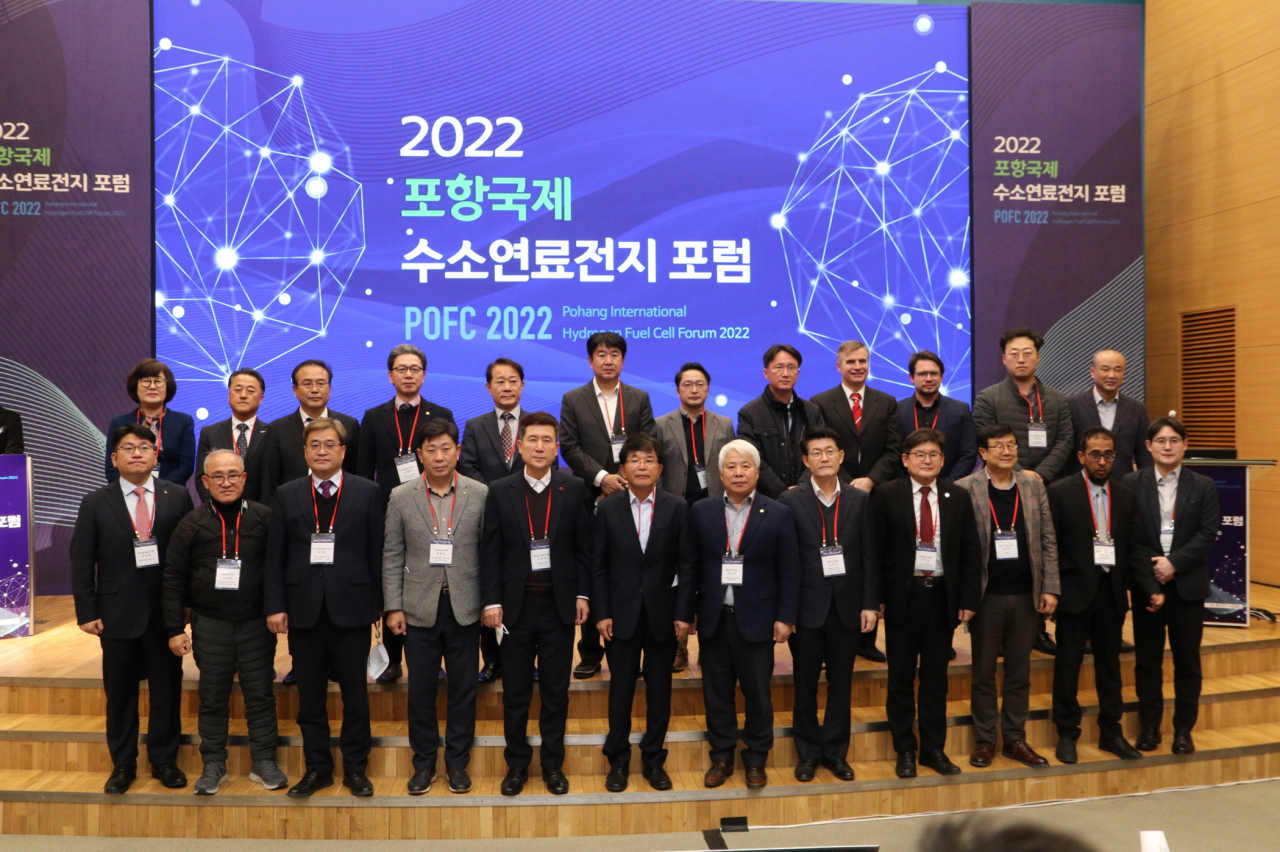FCI builds gigafactory for fuel cell and electrolyzer in the coastal city of Pohang
By Lee Seung-kuPublished : Dec. 19, 2022 - 14:00

Korean energy solution provider Fuel Cell Innovations gives a fresh momentum to the new Hydrogen Fuel Cell Industrial Park in the coastal city of Pohang with a fuel cell and electrolyzer GW scale manufacturing plant.
The energy company plans to invest a total of 150 billion won ($115 million) by 2027 to produce key hydrogen fuel cell components in an automated plant at Pohang’s Blue Valley National Industrial Complex.
The company renewed its commitment to cooperating with Pohang, North Gyeongsang Province, in its hydrogen industry policies in the Pohang International Hydrogen Fuel Cell Forum held on Dec. 7.
FCI CEO Lee Tae-won and Pohang Mayor Lee Kang-deok met on Nov. 30 to launch the construction of a “gigafactory.” The new FCI plant will produce 1 gigawatt of fuel cells per year. The factory is also expected to create 1,500 jobs in the city.
With its focus on environmentally friendly solutions, the company has been expanding its business portfolio here and abroad. The energy company is currently operating clean energy solutions using its water electrolysis technology and high temperature fuel cells, including solid oxide fuel cells (SOFC) and molten carbonate fuel cells (MCFC). SOFC electrolysis can reduce the cost of hydrogen production by up to 30% below the cost of traditional alkaline electrolysis.
In July, the firm signed a business agreement with Korean refinery S-OIL to co-develop ecofriendly hydrogen, fuel cells, and renewable energies. The contract outlines detailed plans to develop an ammonia cracking facility for hydrogen production, and a project to build a one MW fuel cell facility that produces electricity at 60% efficiency and captures 99% of the CO2 it emits while removing large quantities of anthropogenic CO2 from the atmosphere at commercially viable costs.
Earlier this month, FCI inaugurated a facility in Daejeon that can produce an annual 3 megawatts of 1.5 kilowatt SOFC products. SOFC refers to electrochemical conversion devices that generate electricity by directly oxidizing a fuel substance. It is used to produce power to residential and industrial consumers, and to produce power and synthetic fuels for CO2-free or neutral land, sea and air transportation.
The company has also received production approval from the state-owned Korea Gas Safety Corp. in October to manufacture commercial hydrogen products. It is also planning on launching 45 and 240 kilowatt SOFC products early next year and in 2024 to be used in midsized and large buildings and power plants, the company added.
Looking ahead, FCI said it is developing high capacity SOFC products to be used in ships by 2024. The project started in 2020 as a co-development initiative with the Korea Institute of Industrial Technology Evaluation and Management and other partner firms. Key system trials with shipbuilding companies were completed earlier in October, according to FCI.
The energy company is also planning to apply SOFC technology for ammonia production at a lower cost and higher efficiency, a process demonstrated by Haldor Topsoe, for carbon capture-based SOFC, direct ammonia SOFC, and green hydrogen products.
FCI was created as a joint venture between South Korea and Saudia Arabia in 2018. It has been expanded to a consortium between multiple firms from both countries, including S-OIL, Samsung C&T, Saudi Aramco, Taqnia Energy, and Dune Energy, to supply products to Korea, the Middle East and beyond.
The company has been expanding its global business portfolio based on its partnership with companies from Middle Eastern countries.
FCI said it has been working with Saudi Arabian partners to supply fuel cell products to the country’s commercial and industrial facilities, while working to develop products that befit the country’s climate and regulations.
The company also plans to launch its Saudi headquarters in the country’s capital, Riyadh, in 2023, while constructing a green hydrogen production plant in the Arabian country in the near future, it added.
FCI hopes the recent visit to Korea by Mohammed bin Salman, the Saudi Arabian crown prince and prime minister, will act as a catalyst to bolster bilateral cooperation in the area of clean energy, the company said. The visit will greatly expand horizons for future business operations, it added.
Meanwhile, the energy firm was recognized by the Korea Intellectual Property Office for its contribution to the development of Korea’s hydrogen industry, and for its support in creating intellectual property, at a conference held in Ulsan, on Nov. 30.


















![[Today’s K-pop] Treasure to publish magazine for debut anniversary](http://res.heraldm.com/phpwas/restmb_idxmake.php?idx=642&simg=/content/image/2024/07/26/20240726050551_0.jpg&u=)